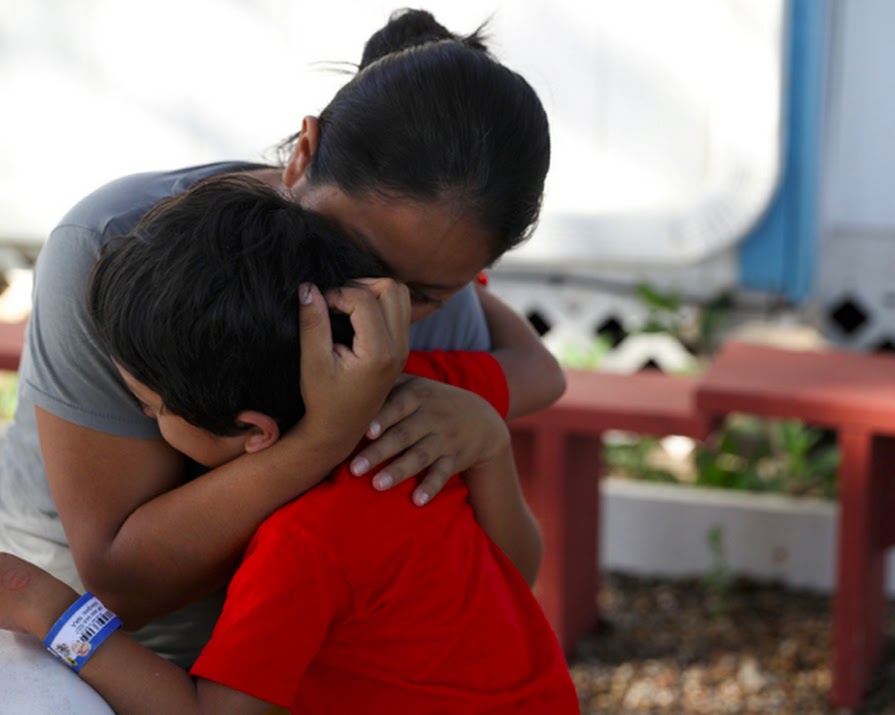
‘He thought I’d left him for good’: The children suffering the trauma of Trump’s family separation
By Amanda Cassidy
08th Nov 2020
08th Nov 2020
Amanda Cassidy speaks to the immigration lawyer still trying to reunite children with their parents on the Texas/Mexico border.
This article was first published in November 2018
His name is Jenri. He lies on the bed, his tiny six-year-old frame flat on his back. Under his orange t-shirt, his chest heaves with sobs.
“You’re not my mommy anymore. You don’t love me.” He’s inconsolable. The image is haunting. His little-boy voice cracks as he repeats this sentence over and over again, his hands covering his face.
“You don’t love me, you don’t love me, you don’t love me.” Footage of him wailing, unable to find solace even now back in his mother’s arms is one of the saddest things you will ever see. His mother Anita is devastated. “The separation was so long, my son has changed so much”.

Jenri was taken from his mother at the Texan border. They’d fled from Honduras and crossed the Rio Grande on a raft to ask for asylum in the US. Agents brought them straight to the detention centre known as the “dog pound” because of the cage links used to hold them.
Jenri was kept from his mother for a month. He is deeply traumatised as a result of the “zero tolerance” policy introduced under the Trump administration.

“I remember Jenri grabbing my clothes and saying “Mommy, I don’t want them to separate us,” Anita explains to journalist Jeremy Raff who spent time with the little boy and who made the documentary about their experience for The Atlantic.
During the ordeal, agents would not tell her where he was being held. “I’d close my eyes then jolt awake seeing my son’s face because we’d never been separated before.” At night, Anita cried silently because the guards forbid them to make noise.
This is America in 2018.
“Off the charts”
This week, we witnessed another dramatic episode in American democracy. Citizens came out to vote for their representatives in Congress in the midterm elections. But the results seem to show a country just as divided as it was two years ago.
Of more concern is that family separations at the country’s borders continue. In fact, many children have still not been reunited with parents. There are missing children and deported mothers and fathers who don’t know when or if they will ever see their children again.
Jenri and Anita’s immigration attorney is Texan-based Jodi Goodwin. We spoke to her about her struggle when it comes to Homeland security. “My biggest challenge at the moment is trying to get even the smallest of things done.
Things like getting hearing notices to court, finding out information about where clients are being kept, filing notices of appearance. It is making practising law unbearable. I also practice in Federal criminal court and getting information is not problematic at all.
The Department of Homeland makes everything so damn difficult. They dig their heels in when there is no need. It is just combative. The level of difficulty in dealing with ICE over the last 18 months has been off the charts – and it is coming from above.”

Goodwin, who has been working with other family separation cases, says it is sometimes the emotional side of things that is the most challenging part. “It is a very taxing job, especially at the moment.
It is a job where you have to deal with a lot of trauma and you are dealing with those who have gone through some pretty difficult events. I’m in a particularly good place in terms of my ability to work with people. I’ve been trained and counselled and I know that I can do some good for them.”
“But each case has the ability to really get me in my heart. I find it hard to wrap my head around the horrific way humans are treating others. I can compartmentalise, but the level of trauma and mental health strain that is becoming apparent is really concerning – especially for the children. ”
Goodwin is responsible for finally reuniting Anita with Jenri. She said that although Anita passed the interview to seek asylum, she was then denied bond; which meant she would remain in custody, possibly for months.
Goodwin told documentary-maker Raff that she made some calls to the deportation officer and she didn’t mince her words. ‘I said, ‘this is bullsh*t…to continue to cause prolonged trauma to a fu*king five-year-old.”
Anita was released. She’d been apart from her son for four weeks.

The worst trauma
“When I was working with Anita and Jenri – I could work with Anita more than I could work on Jenri,” Goodwin admits. “I was giving legal and emotional counselling to Anita. I’d see her two-to-three times a week and watch her struggle. She wasn’t able to stand she was so weak from emotional distress.
Seeing for myself the effects on Jenri and experiencing that was the worst trauma. Knowing that this little child had been so psychologically harmed.
“It will take decades to fix him. He didn’t know what was going on, all he knew is that he was pulled away from his mum.”
Goodwin says that the anti-immigration agenda of the current administration means that it is likely to happen again. “That fear of it happening again is incredibly real – in fact, they are still doing it today.
Families are being separated, placed in different detention facilities. Some that were separated last May are still not reunited. It makes no sense to me, personally and professionally. There is no legal justification to do this – it is a flat out lie.
I think not only is it a violation of international law, but it is in violation of what is moral and right and just. There is no way that it is appropriate or lawful to take kids away from their parents in this way.”

Moving forward
As hard as it is to believe, Anita and Jenri are some of the luckier ones. They found each other and now live in North Carolina while they await their case hearing. Jenri is still not the same child he was before he was taken from his mother, but Goodwin says they are doing their best to move forward.
“They are doing well. They are able to get social services. Jenri started school and we stay in touch.” You can tell Goodwin has formed a bond with this family – the human side of a very inhumane system. Mentioning Jenri, she smiles for the first time since the interview started. “He sends me a lot of voice messages on WhatsApp”, she says fondly.
“He keeps me up to date with what’s going on with him. But mostly he tells me that he loves his lawyer,” she laughs.
The theme of separation is America’s new legacy. It is the Divided States of America where people are being told that every immigrant is a criminal and where fearmongering dictates policy. Goodwin is right, there are better ways of handling immigration without resorting to such trauma.
Increased investment and cooperation with central American’s governments would help to stabilise their societies and help deter the influx of migrants. But that’s a big knot to undo. Fear is the easiest fix, and children, the easiest targets.























